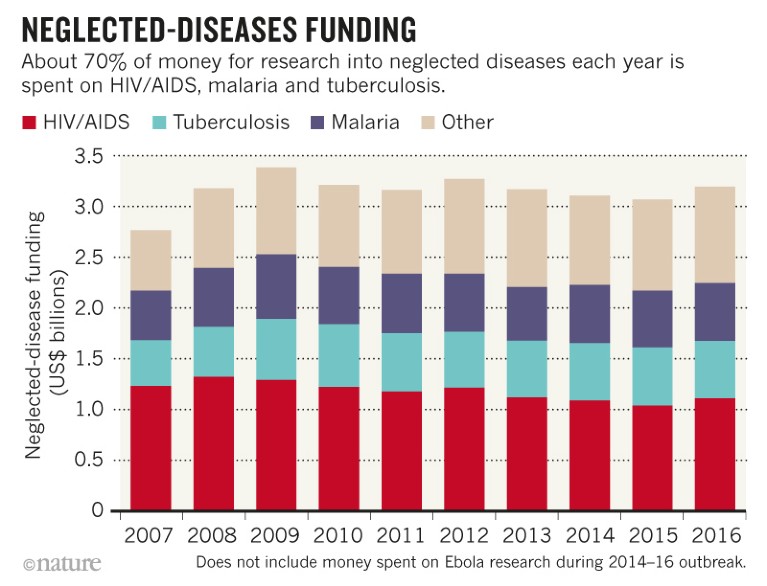SPACE
Saturn’s surprisingly youthful rings Saturn’s rings are only a few hundred million years old, findings from NASA’s Cassini spacecraft suggest. Cassini measured the rings’ gravitational pull, confirming that they are relatively lightweight, which means they could not have endured for billions of years, as some researchers have suggested. Data on how much interplanetary dust has fallen onto the rings over time separately indicate that the rings cannot be more than about 200 million years old. If they were older, they would look dirtier. The studies were presented on 12 and 13 December at the American Geophysical Union meeting in New Orleans, Louisiana.

CREDIT: NASA/JPL-Caltech/Space Science Institute
FUNDING
Energy cash The US Department of Energy illegally blocked funding for a major energy-research programme, the US Government Accountability Office said on 12 December. In May, President Donald Trump released a fiscal-year 2018 budget request that proposed eliminating the Advanced Research Projects Agency—Energy (ARPA-E), which funds the development of innovative energy technologies. But the energy department overstepped its authority when it withheld from ARPA-E US$91 million that had already been allocated by Congress. The funds have since been released.
RESEARCH
Arctic thaw Rising temperatures continue to transform the Arctic, an international team of climate scientists concluded in the 2017 Arctic Report Card released by the US National Oceanic and Atmospheric Administration on 12 December. “The Arctic shows no sign of returning to the reliably frozen region it was decades ago,” the agency said. Sea ice is thinning, and its annual maximum extent reached a record low this year. Permafrost is thawing in Alaska, the Canadian high Arctic and the Norwegian Svalbard archipelago, the analysis found, and average air temperatures this year were the second warmest since 1900.
Exoplanet find Astronomers have discovered an eighth planet circling a distant star called Kepler-90. The only other star with as many known planets is the Sun. The planet — which is 780 parsecs, or 2,545 light years, from Earth — was spotted in a data analysis by scientists at Google and the University of Texas at Austin, NASA said on 14 December. The scientists trained a computer to sort through signals from the Kepler Space Telescope, looking for the slight dimming of a star’s light when a planet moves across its face. Researchers say that such use of artificial intelligence to analyse archived data from the Kepler telescope could lead to more discoveries.
EVENTS
Myanmar deaths At least 6,700 members of the Rohingya ethnic group were killed by the Myanmar military and local militias in Rakhine State between 25 August and 24 September, says a report from medical charity Médecins Sans Frontières (MSF). The analysis, released on 14 December, was based on surveys of refugees in Bangladesh, and adds support to ethnic-cleansing charges levelled by the United States and human-rights groups. MSF says that 69% of the dead were shot, 9% burned alive, 5% beaten to death and 3% died as a result of sexual violence. The surveys probably underestimate the death toll, MSF says, because they do not account for Rohingya remaining in Myanmar, or for killings of entire families.
Biometrics dispute Chinese authorities are collecting biometric data from the majority of Muslim Uighur people living in the northwestern province of Xinjiang, according to advocacy group Human Rights Watch. Although police in the region have previously collected DNA samples from some residents, a report released by the group on 13 December says that authorities are now also taking fingerprints and iris scans, and recording blood types, from all residents aged between 12 and 65. The report, which seems to be blocked in mainland China, called the practice “a gross violation of international human rights norms”. An editorial in the Chinese government newspaper Global Times on 14 December says that the data is used “for accurate demographic and diverse biological information in the regions”. It denies that the practice is an abuse of human rights.
FACILITIES
Hard disks arrive A long-awaited shipment of astronomical data from the South Pole — part of a planet-wide effort to observe the black hole at our Galaxy’s centre — finally arrived at the Haystack Observatory in Westford, Massachusetts, on 13 December. The cargo travelled by air, sea and land, and completes the data set of the Event Horizon Telescope project, which harnessed nine radio telescopes across Earth in April. The racks of disks hold data captured at the South Pole Telescope, and could not be shipped out until flights resumed after the long Antarctic winter. The project’s researchers will now begin analysing the data to tease out details about the black hole’s shape.

Racks of disks.CREDIT: MIT Haystack Observatory
Google in China Technology giant Google announced on 13 December plans to open a centre for artificial-intelligence (AI) research in Beijing. Fei-Fei Li, chief scientist of AI and machine learning at Google Cloud and a computer scientist at Stanford University, California, will coordinate a team of scientists and lead the research. The team will publish its work, and the centre will also arrange conferences and workshops to collaborate with the Chinese AI research community. Google already has AI research groups in New York, Toronto, London and Zurich. Many see the centre as part of Google’s effort to ease its way back into the Chinese market, where its products have been largely blocked since 2010.
Fines for lab death Imperial College London, one of Britain’s leading universities, has been fined £70,000 (US$93,000) over the death of an HIV researcher in a laboratory room in 2011. Damian Bowen, 32, suffocated at St Stephens Centre Laboratory while decanting liquid nitrogen from flasks to freeze blood samples for transport. An investigation found that the room’s ventilation system had been switched off, and that the death could have been prevented if the system had been on. Liquid nitrogen quickly expands as a gas, displacing oxygen. The Chelsea and Westminster NHS Trust, a hospital group that leased the room to Imperial, was fined £80,000. The fines were handed down at a London court on 12 December.
PEOPLE
Nature’s editor Philip Campbell, the long-time editor-in-chief of Nature and the family of Nature research journals, is to step down from his position in July 2018. Springer Nature, the journal’s publisher, announced the move on 13 December. Campbell first joined Nature in 1979, working in its physics team. He left in 1988 to found the magazine Physics World, and became Nature’s editor in December 1995, succeeding the late John Maddox. In 2015, he was knighted for his services to science. “After more than 22 years happily in the job, I feel it’s time for a new phase in my working life,” Campbell said. He will take on a new role as editor-in-chief of Springer Nature’s portfolio of journals, books and magazines. Nature has had only seven editors since it was founded in 1869.
Innovation scholar Kenyan scholar Calestous Juma, who championed the use of science and technology to aid development in Africa, died on 15 December, aged 64. He was a professor of international development at the Harvard Kennedy School in Cambridge, Massachusetts. Growing up on the shores of Lake Victoria, Juma paid his own school fees by fixing and selling old radios and loudspeakers. He became one of Africa’s most prominent academics, and in 1988 founded the African Centre for Technology Studies in Nairobi, the continent’s first science-policy think tank. Later, while working at the United Nations, he promoted science and technology as a tool for achieving the Millennium Development Goals.
POLITICS
US tax waiver The latest version of major US tax legislation omits a provision that would have ended a tax break on tuition-fee waivers, which universities often give to graduate students who conduct research or teach. Students and institutions had protested against the provision, which was included in an earlier version of the tax bill that the US House of Representatives approved in mid-November. They argued that taxing tuition waivers could drastically increase tax bills for many graduate students. The House and the Senate are expected to vote on the latest version of the legislation before the end of the year.
TREND WATCH
Global funding for research on neglected diseases rose for the first time in five years in 2016, according to the annual G-FINDER report, released on 13 December. US$3.2 billion was spent on such research in 2016, with the US government the largest funder, investing $1.5 billion. The data encompass public and private funds, but, unlike in previous reports, do not include cash spent on tackling the Ebola outbreak in West Africa. Policy Cures Research in Sydney, Australia, prepared the report.

Source: Policy Cures Research



